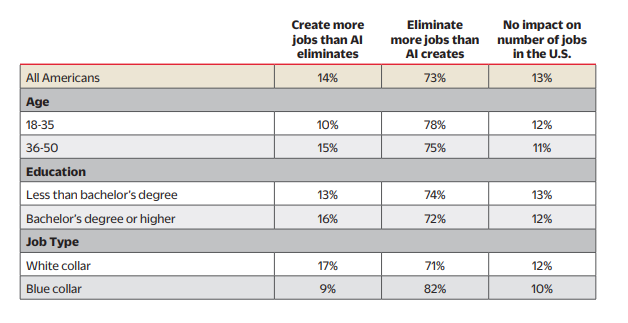US sees bigger threat from AI than immigrants – move the wall!US sees bigger threat from AI than immigrants – move the wall!
Research from Northeastern University claims 73% of Americans believe AI will lead to a loss of more jobs than it creates, while 58% say the technology is a bigger threat to their job than immigration.
March 12, 2018

Research from Northeastern University claims 73% of Americans believe AI will lead to a loss of more jobs than it creates, while 58% say the technology is a bigger threat to their job than immigration.
The second statistic is an interesting one as perhaps it will have an impact on the political propaganda campaigning which we have been victim witness to over the last 18 months. Being a bit more specific, the Brexiteers mission to tarnish the reputation of those horribly cultured Europeans and President Trump’s fearmongering mission to isolate the dastardly work-conscious Mexicans.
According to the data, 12% of Americans are worried about losing their job to an immigrant while 23% are more concerned about AI; the politicians have got it wrong, we shouldn’t be looking across our borders in trepidation, we should be pointing the finger at those nefarious geeks in California. Perhaps Trump can use the promise of building a wall around Silicon Valley as the foundation of his next campaign; American jobs for American HUMANS.
Interestingly enough the research also states the American people are not being bought out by the shallow and presumptuous claims from governments and technology firms that there will not be a downside to the technology. The table below, from the research, demonstrates there is a sense of realism about the technology.

AI has the power to be an incredible catalyst for positive change, but this positive change will come at a cost. The incorporation of ‘intelligence’ has been billed as the fourth industrial revolution, and just as there was with the other industrial revolutions there will be job losses, redundancies and the displacement of people. Right now not enough is being done to reskill those at risk or create an education system to allow people to take advantage of the information age.
These are the two areas of risk. Firstly, AI will make huge numbers of people redundant. It will of course create some new jobs for data scientists who can use this insight, but the data processing jobs which will be lost to create this analytical position will out-number the gain. The next question is how many of these redundant individuals will be qualified for the newly created position?
We doubt there will be many right now, as if they were qualified they would be working as data scientists not in a data entry position; it’s not like this isn’t a position in demand right now. The government has a responsibility to ensure these people are not simply left out in the cold when the AI revolution gains some traction as the companies themselves will probably start looking towards universities for talent as opposed to in their current operations. Are there enough initiatives in place to help these people transition to the digital economy? We do not believe so.
The second area of risk is in an individual’s education. We are going to take this slightly out of context right now as we are based in the UK, however national curriculums are not preparing students for the digital economy. Looking at the compulsory topics in schools right now it isn’t too dissimilar to what your correspondent had to endure during his earlier years. A huge amount has changed over the last decade, and a lot more will change over the next one; are we preparing our youngsters correctly?
IT is a compulsory topic, but these lessons are pretty basic skills. Almost every company is now reliant on technology, with software now being at the heart of this revolution. If governments are serious about protecting the best interest of people and their livelihoods in the long-term, surely coding, data analysis and other digitally relevant skills should be prioritized.
The industry and government has to be realistic about this technology. Yes, it can bring benefits but there will also be pain. New revenue streams and value add initiatives will be brought to an organization, but it is also an efficiency technology. Efficiency generally means fewer overheads, and in the business world the biggest expense is the payroll. Of course there are going to be redundancies if there is a technology which can do it cheaper and quicker; this is just a sensible business decision.
The negative side of the technology cannot be avoided, but the acceptance that it exists and is going to be much bigger than anyone is currently giving it credit for is a good starting point. The sooner the facts are accepted, the more effectively the challenge can be managed.
About the Author
You May Also Like










.png?width=300&auto=webp&quality=80&disable=upscale)


_1.jpg?width=300&auto=webp&quality=80&disable=upscale)